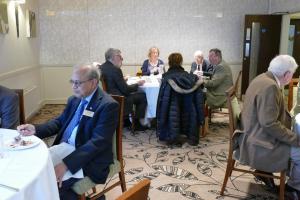New Year Message
Thu, Jan 9th 2025 at 12:30 pm - 2:30 pm
(At the Ivy Hill Hotel.) Given by Cllr Chris Davidson, Chelmsford City Council's Cabinet Member for Finance.

 Our New Year Message should have been delivered by Stephen Robinson, the Leader of Chelmsford City Council, but in the end he was too busy working on the government’s plans for reducing the number of local authorities. Chris Davidson, the Cabinet Member for Finance, came instead.
Our New Year Message should have been delivered by Stephen Robinson, the Leader of Chelmsford City Council, but in the end he was too busy working on the government’s plans for reducing the number of local authorities. Chris Davidson, the Cabinet Member for Finance, came instead.
Naturally, his message focused on the City Council’s finances. Each year the Chief Finance Officer has to certify that the Council’s budget plans are sustainable. However, it is difficult to achieve a balanced budget because of the costs the Council is under a legal obligation to pay for.
Housing is an example. The cost of private housing, whether bought or rented, is rising all the time whilst the number of homeless people in the area is increasing. We can see this in the number of homeless people on Chelmsford’s streets. The shortage of local housing is so acute that on at least one occasion the Council has had to rehouse a family as far away as Wolverhampton.
Add to this the increase in the minimum wage and the imposition of national insurance contributions on employers and the Council’s financial position becomes even worse. The costs are increasing by more than the maximum of 3% the Council is allowed to add to its council tax each year. The City Council only receives about 10% of the council tax householders have to pay. The rest is made up by council tax imposed by the Essex County Council, the Police Fire and Crime Commissioner and others with local statutory functions.
The Council has therefore taken steps to balance the budget for the forthcoming financial year. Householders are most likely to notice the introduction of a charge for collecting the brown bins used for garden waste, which until now has been free. From 1 March onwards householders will have to pay £60 a year for the first brown bin they put out each week and another £30 for a second. However, there is nothing to stop a group of neighbours sharing brown bins. It is possible for a household to reduce the number of brown bins it uses by putting some of the garden waste on compost heaps.
The Council may have to take further steps for the following financial year. Any cuts needed will have to fall on the Council’s non-statutory services. The first to go could be the maintenance of the parks. The Council’s theatres are unlikely to be affected as they are paying their way.
Chris agreed to take questions. Inevitably one related to the complicated procedure and the cost of taking items to the Council tip. Chris pointed out that this was not a matter for the City Council as the waste tip was controlled by the County Council.
Also inevitably, someone raised complaints about the number of potholes in our area. The same answer applied; roads are the responsibility of the County Council.
'What We Do' Main Pages:










